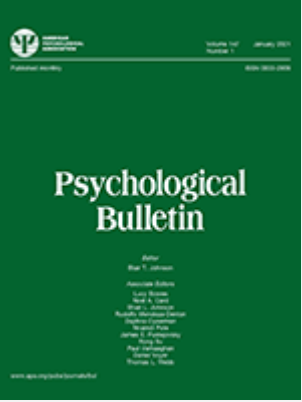性别歧视的全球衰退:一项对各国敌意性别歧视、善意性别歧视和性别不平等趋势的多层次元分析综述。
IF 19.8
1区 心理学
Q1 PSYCHOLOGY
引用次数: 0
摘要
性别歧视和性别不平等在世界范围内的持续流行是研究的重点。我们荟萃分析了自矛盾性别歧视理论(1996-2023)创立以来所有测量敌意性别歧视(即贬义态度)或仁慈性别歧视(即施恩态度)对女性的研究。使用来自81个国家的1097个样本,我们考虑了矛盾性别歧视理论原则的证据,包括敌意性别歧视和善意性别歧视的认可程度(a)不同年份的差异,(b)相互关联的程度,以及(c)与国家性别不平等的程度。多层次元分析模型表明,对性别歧视的认可通常遵循多年来小幅下降的轨迹,提供了强有力的证据,表明性别歧视是“矛盾的”,因为敌意性别歧视始终与更大的善意性别歧视相关,并表明人们对一个国家敌意性别歧视的更大认可预示着该国更大的性别不平等,尽管这种关联在后来的样本中减弱。这些测试的影响说明了需要研究的理论差距:调查为什么一些国家的性别歧视下降趋势相对于其他国家更为明显,确定性别不平等的最适当标志,并具体说明经历不平等与认可性别歧视之间的时间间隔。我们的多层次荟萃分析提供了关于矛盾性别歧视的跨国模式的初步信息,并确立了纵向文化研究的必要性,以确定矛盾性别歧视的起源及其对全球性别不平等的影响。(PsycInfo Database Record (c) 2025 APA,版权所有)。本文章由计算机程序翻译,如有差异,请以英文原文为准。
The global decline in sexism: A multilevel meta-analytic review of trends in countries' hostile sexism, benevolent sexism, and gender inequality over time.
The continued prevalence of sexism and gender inequalities across the world is a priority for research. We meta-analyzed all research since the inception of ambivalent sexism theory (1996-2023) that measured hostile sexism (i.e., derogatory attitudes) or benevolent sexism (i.e., patronizing attitudes) toward women. Using 1,097 samples from 81 countries, we considered evidence for principles of ambivalent sexism theory, including the extent to which endorsements of hostile sexism and benevolent sexism (a) differed across years, (b) were associated with one another, and (c) were associated with countries' gender inequalities. Multilevel meta-analytic models indicated that endorsement of sexism generally followed trajectories of small declines over years, provided robust evidence that sexism is "ambivalent" because hostile sexism was consistently associated with greater benevolent sexism, and suggested that people's greater endorsement of hostile sexism in a country predicted greater gender inequality in that country, although this association was attenuated in later samples. Implications of these tests informed theoretical gaps in need of research: investigating why the declining trajectories of sexism were stronger in some countries relative to others, identifying the most appropriate markers of gender inequality, and specifying the time lags between experienced inequalities and endorsement of sexism. Our multilevel meta-analysis provided initial information about the cross-country patterns of ambivalent sexism and established a need for longitudinal cultural research to identify the origins of ambivalent sexism and its consequences for gender inequalities across the world. (PsycInfo Database Record (c) 2025 APA, all rights reserved).
求助全文
通过发布文献求助,成功后即可免费获取论文全文。
去求助
来源期刊

Psychological bulletin
医学-心理学
CiteScore
33.60
自引率
0.90%
发文量
21
期刊介绍:
Psychological Bulletin publishes syntheses of research in scientific psychology. Research syntheses seek to summarize past research by drawing overall conclusions from many separate investigations that address related or identical hypotheses.
A research synthesis typically presents the authors' assessments:
-of the state of knowledge concerning the relations of interest;
-of critical assessments of the strengths and weaknesses in past research;
-of important issues that research has left unresolved, thereby directing future research so it can yield a maximum amount of new information.
 求助内容:
求助内容: 应助结果提醒方式:
应助结果提醒方式:


